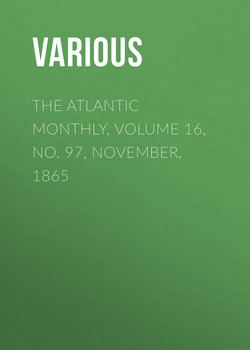The Atlantic Monthly, Volume 16, No. 97, November, 1865

Реклама. ООО «ЛитРес», ИНН: 7719571260.
Оглавление
Various. The Atlantic Monthly, Volume 16, No. 97, November, 1865
WHY THE PUTKAMMER CASTLE WAS DESTROYED
THE RHYME OF THE MASTER'S MATE
FORT HENRY
THE VISIBLE AND INVISIBLE IN LIBRARIES
LETTER TO A YOUNG HOUSEKEEPER
THE PEACE AUTUMN
DOCTOR JOHNS
XXXVII
XXXVIII
XXXIX
RODOLPHE TÖPFFER,
THE GENEVESE CARICATURIST
THE CHIMNEY-CORNER
X. THE WOMAN QUESTION: OR, WHAT WILL YOU DO WITH HER?
JEREMY BENTHAM
A FAREWELL TO AGASSIZ
THE FORGE
CHAPTER I
CHAPTER II
CHAPTER III
CHAPTER IV
CHAPTER V
CHAPTER VI
CHAPTER VII
CHAPTER VIII
THE PROGRESS OF THE ELECTRIC TELEGRAPH
Table I
Table II
Table III
THE FIELD OF GETTYSBURG
ALEXANDER HAMILTON
REVIEWS AND LITERARY NOTICES
RECENT AMERICAN PUBLICATIONS
Отрывок из книги
A visible library is a goodly sight. We do not underrate the external value of books, when we say it is the invisible which forms their chief charm. Sometimes rather too much is said about "tall copies," and "large-paper copies," and "first editions," the binding, paper, type, and all the rest of the outside attraction, or the fancy price, which go to make up the collector's trade. The books themselves feel a little degraded, when this sort of conversation is carried on in their presence: some of them know well enough that occasionally they fall into hands which think more "of the coat than of the man who is under it." We must, however, be honest enough to confess that we are ourself a bibliomaniac, and few possessions are more valued than an old manuscript, written on vellum some five hundred years ago, of which we cannot read one word. Nor do we prize less the modern extreme of external attraction,—volumes exquisitely printed and adorned, bound by Rivière, in full tree-marbled calf, with delicate tooling on the back, which looks as if the frost-work from the window-pane on a cold January morning had been transmuted into gold, and laid on the leather. Ah, these are sights fit for the gods!
Nevertheless, we come back to our starting-point, that what is unseen forms the real value of the library. The type, the paper, the binding, the age, are all visible; but the soul that conceived it, the mind that arranged it, the hand that wrote it, the associations which cling to it, are the invisible links in a long chain of thought, effort, and history, which make the book what it is.
.....
Coming back from the Paduan hall, so weird and ghostly, we glance along the shelves at a long row of volumes which bear De Quincey's name, and we need not open a page to feel the mysterious spell of the opium-eater. Like one of those strange dreams of his seems a remembrance which comes back to us with his name. A quaint, tall house in the old part of Edinburgh has admitted us into a quiet apartment, where, as the twilight is creeping in through the windows, a small gray man receives us, with graceful and tender courtesy. He converses with a felicity of language like that of his printed pages, but in a voice so sweet, so low, so exquisitely modulated, that the magical tone vibrates on the ear like music. It was De Quincey, who held us entranced until darkness gathered around us, then bade us farewell, his kind words lingering on the air, as, with a flickering candle in his hand, he flitted up the winding stair, and vanished away.
Another volume bears the name of William Wordsworth, and beneath his autograph he writes that it was purchased at Bath from a circulating-library. It is that strange journal of the Margravine of Bareith, sister of Frederic the Great, a sad story of those who dwell in kings' houses; but we think only of Wordsworth, and of the viewless history of the book carried by the poet from circulating in Bath to quiet rural Rydal Mount, and now having wandered over to New England.
.....